Testosterone is a critical hormone in men, playing a vital role in their physical development, health, and overall well-being. As men age, their testosterone levels naturally decline, leading to various symptoms that can significantly impact their quality of life. Testosterone Replacement Therapy (TRT) has emerged as an effective treatment to address these issues, providing numerous benefits. This article explores the various advantages of TRT for men, offering a comprehensive understanding of its positive impacts.

Image: Pexels
Personalized Treatment and Monitoring
An essential aspect of Testosterone Replacement Therapy is the need for personalized treatment and monitoring. Every individual’s body responds differently to TRT, and it’s crucial to tailor the therapy to meet specific needs and conditions. For example, men in treatment like trt Scottsdale receive customized plans based on comprehensive evaluations, ensuring optimal outcomes and minimizing potential risks. Regular monitoring is vital to track progress and make necessary adjustments to the therapy.
Healthcare providers typically conduct periodic blood tests to measure testosterone levels and assess overall health. This ongoing monitoring helps ensure that the therapy remains effective and safe, allowing men to reap the maximum benefits of TRT.
Enhanced Physical Health
Testosterone Replacement Therapy has been shown to provide significant improvements in physical health for men suffering from low testosterone levels. One of the primary benefits is increased muscle mass and strength. Testosterone is crucial for muscle protein synthesis, and its supplementation can lead to enhanced muscle growth and recovery. Men undergoing TRT often report better performance in physical activities and exercises, contributing to a more active and healthier lifestyle.
Additionally, TRT can help reduce body fat. Low testosterone levels are associated with an increase in body fat, particularly in the abdominal region. By restoring testosterone levels, men can experience a reduction in fat mass, which is not only beneficial for appearance but also for overall health. Excess abdominal fat is linked to various health issues, including cardiovascular diseases and diabetes.
Improved Mental Health and Cognitive Function
Mental health and cognitive function are other critical areas where Testosterone Replacement Therapy can make a significant difference. Low testosterone levels have been linked to mood swings, depression, and anxiety. Men with low testosterone often experience feelings of fatigue, irritability, and a general lack of motivation. TRT can alleviate these symptoms by restoring hormonal balance, leading to improved mood and mental well-being.
Moreover, testosterone has been found to play a role in cognitive function. Studies suggest that men with higher testosterone levels tend to perform better on tasks involving memory, attention, and spatial abilities. As testosterone levels decline with age, so does cognitive performance. TRT can help maintain and even improve cognitive functions, allowing men to stay sharp and focused as they age.
Enhanced Sexual Health and Performance
One of the most well-known benefits of Testosterone Replacement Therapy is its positive impact on sexual health and performance. Low testosterone levels are commonly associated with decreased libido, erectile dysfunction, and reduced sexual satisfaction. TTRT can effectively address these issues by restoring your normal testosterone levels, potentially leading to improving your sexual stamina and desire.
Men undergoing TRT often report improvements in their sexual experiences, including better erections and increased sexual stamina. This enhancement in sexual health can have profound effects on overall well-being and relationship satisfaction. By addressing erectile dysfunction and low libido, TRT helps men regain confidence and enjoy a healthier, more fulfilling sex life.
Cardiovascular Health Benefits
Testosterone Replacement Therapy has been linked to various cardiovascular health benefits. There is evidence to suggest that low testosterone levels are associated with an increased risk of cardiovascular diseases, including heart attacks and strokes. By restoring testosterone to normal levels, TRT can help reduce these risks and promote better cardiovascular health.
Studies have shown that TRT can improve several markers of cardiovascular health, such as cholesterol levels, blood pressure, and arterial stiffness. For instance, TRT can lead to an increase in HDL (good) cholesterol and a reduction in LDL (bad) cholesterol, which are crucial for maintaining a healthy heart. Additionally, TRT can improve blood circulation and reduce the risk of atherosclerosis, a condition characterized by the hardening and narrowing of the arteries.
Increased Bone Density
Osteoporosis and bone density loss are significant concerns for aging men, particularly those with low testosterone levels. Testosterone plays a crucial role in bone metabolism, promoting bone formation and reducing bone resorption. Men with low testosterone levels are at a higher risk of developing osteoporosis, which can lead to fractures and other serious complications.
Testosterone Replacement Therapy can help increase bone density and strength, reducing the risk of fractures and improving overall bone health. This benefit is especially important for older men, who are more susceptible to bone-related issues.

Testosterone Replacement Therapy offers a multitude of benefits for men suffering from low testosterone levels. From enhancing physical and mental health to improving sexual performance and cardiovascular health, TRT can significantly impact overall well-being and quality of life. By addressing issues such as muscle loss, mood swings, and sexual dysfunction, TRT helps men lead healthier, more fulfilling lives. However, it is essential to approach TRT under the guidance of a healthcare professional to ensure personalized treatment and effective monitoring.
MindOwl Founder – My own struggles in life have led me to this path of understanding the human condition. I graduated with a bachelor’s degree in philosophy before completing a master’s degree in psychology at Regent’s University London. I then completed a postgraduate diploma in philosophical counselling before being trained in ACT (Acceptance and commitment therapy).
I’ve spent the last eight years studying the encounter of meditative practices with modern psychology.

